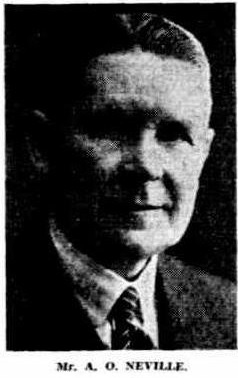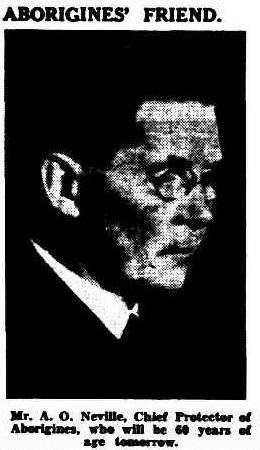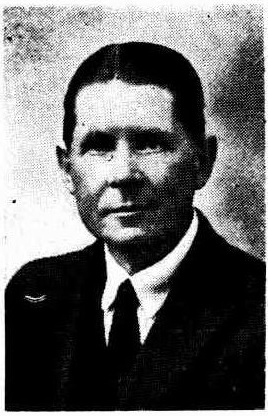A. O. Neville facts for kids
Auber Octavius Neville (born 20 November 1875 – died 18 April 1954) was a British-Australian government worker. He is best known for his role as the Chief Protector of Aborigines in Western Australia.
Contents
Early Life
Neville was born in Northumberland, England. As a child, he moved to Victoria, Australia.
Career and Role as Chief Protector
In 1897, Neville moved from Victoria to Western Australia. He quickly joined the government service and moved up in his career. By 1910, he became the secretary of a new department. This department helped organize immigration and tourism. He helped about 40,000 people move to Western Australia. When World War I started, he became the secretary of the War Patriotic Fund.
In 1915, Neville was chosen as the second Chief Protector of Aborigines for Western Australia. For the next 25 years, he was in charge of a very debated policy. This policy involved taking Aboriginal children away from their families. These children are now known as the Stolen Generations.
In 1936, Neville became the Commissioner for Native Affairs. He held this job until he retired in 1940.
The Stolen Generations Policy
The policy of removing children of mixed Aboriginal and European heritage from their families was supported by some at the time. The idea was to raise these children as if they were white. The hope was that they would marry people with lighter skin. Over many generations, the goal was for Aboriginal people to become part of the non-Aboriginal community. Some believed that full-blood Aboriginal people were disappearing.
In 1934, the Western Australian government started the Moseley Royal Commission. This group looked into the lives of Aboriginal people and the role of the Chief Protector. As a result, the Chief Protector was given even more power over Aboriginal people's lives. Some people say this only made their suffering worse.
In 1937, Neville shared his thoughts on the policy:
- "Are we going to have one million blacks in the Commonwealth or are we going to merge them into our white community and eventually forget that there were any Aborigines in Australia?"
Neville believed that mixing Aboriginal people into the wider community was the way to "improve" the "Native race." He spoke at the Moseley Royal Commission. He defended the policies of forced settlement and taking children from their parents. He also supported monitoring and punishing Aboriginal people. He argued that:
- "They have to be protected against themselves whether they like it or not. They cannot remain as they are. The sore spot requires the application of the surgeon's knife for the good of the patient, and probably against the patient's will."
Neville stated that children were not removed without reason. He said:
- "The children who have been removed as wards of the Chief Protector have been removed because I desired to be satisfied that the conditions surrounding their upbringing were satisfactory, which they certainly were not."
Australia's Coloured Minority
In 1947, after he retired, Neville wrote a book called Australia's Coloured Minority. In this book, he explained his plan for Aboriginal people to become part of non-Aboriginal Australia. The book defended his policies. However, it also admitted that Aboriginal people had been hurt by European actions. Because of this, he said more needed to be done to help them:
- "I make no apologies for writing the book, because there are things which need to be said. So few of our own people as a whole are aware of the position [of Aborigines]. Yet we have had the coloured man amongst us for a hundred years or more. He has died in his hundreds, nay thousands, in pain, misery and squalor, and through avoidable ill-health. Innumerable little children have perished through neglect and ignorance. The position, in some vital respects, is not much better today than it was fifty years ago. Man is entitled to a measure of happiness in his life. Yet most of these people have never known real happiness. Some are never likely to know it. The causes of their condition are many. Mainly it is not their fault, it is ours, just as it lies with us to put the matter right."
After his retirement, Neville was asked to represent Western Australia. This was for discussions about Aboriginal Welfare related to the Woomera Test Range.
Neville lived in Darlington. He often used the Eastern Railway. This railway closed a few months before he died. He passed away in Perth and was buried in Karrakatta Cemetery.
Portrayals
Neville has been shown in movies and plays. He was seen as the public face of the Stolen Generations policy.
- In the 2002 film Rabbit Proof Fence, he was played by Kenneth Branagh.
- In Jack Davis' 1985 play, No Sugar, he was also a character.
See Also
 | Isaac Myers |
 | D. Hamilton Jackson |
 | A. Philip Randolph |




